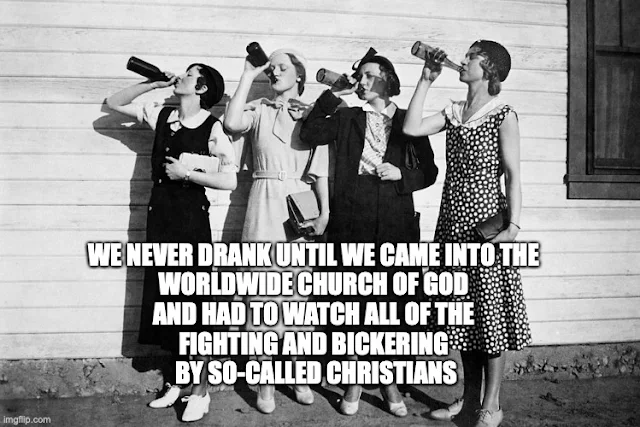It has been a while since I have checked out the posts on Concretized Christianity They had this excellent piece up recently about how the Church of God has been so good at taking scripture out of context. They start off with a zinger about the "cheerful giver", which has been twisted by the COG to justify tithing and giving generously to the church. They demonstrate that it means nothing of the sort.
One example of this is something we hear on almost every holy day.
“But this I say: He who sows sparingly will also reap sparingly, and he who sows bountifully will also reap bountifully. So let each one give as he purposes in his heart, not grudgingly or of necessity; for God loves a cheerful giver.” (II Corinthians 9:6-7) is often read before taking up an offering, as if it applies to giving money to a corporate organization. But, when you read the context in II Corinthians 8, it is really about collecting an offering for another congregation (in Jerusalem) in need.
So beyond the misuse of the scriptures for something it’s not talking about, let’s stop and consider whether we have ever had a request to help another congregation in need. Have you seen a collective effort for food, water, money, supplies, etc., for example, for a congregation in an area that has been devastated by a tornado, a wildfire, or a hurricane? Have volunteers from the COG congregations poured into those communities to help out?
The short answer is “No.” The corporate COG groups diss “so-call Christians” for many things, and yet these are the very people who respond in a tangible way after a disaster. Want to make disciples and preach the gospel? Live it by helping and serving others, especially when their worlds have been turned upside down.
In fact, is this any different than what we will be doing when Jesus establishes God’s kingdom on the earth? Humans who are still alive are going to be shell-shocked and they will need the most basic of their needs met. Food, water, shelter, clothing.
Someone thumping on a Bible and “preaching” at them won’t help them a bit. Someone helping provide those basic necessities will. In the process, they will see the fruit of God’s spirit on display: agape, joy, peace, patience, kindness, goodness, faithfulness, gentleness, and self-control. That will make an impact, considering what they have just experienced, and that’s the first step.
One of the things that the COG groups imply is that we’ll have offices and ranks and we will sit on thrones and direct little underlings, but you and I won’t actually get in there and get our hands dirty laboring to help people. For me, that’s no better than the idea of going to heaven and playing a harp for eternity.
We’ll be a kingdom of priests to our God. What does that look like? We don’t have to look any further than our High Priest, Jesus. What did He do when He was on the earth? What does He do now?
He served and He serves. He didn’t go sit down and pontificate somewhere and ignore the needs of the people he encountered. He healed, he fed, he counseled. Most of his actual teaching was confined to his disciples (120 by the time we get to Acts 1). Now as our High Priest, He mediates, intercedes, and saves us. That’s work, my friends (at least in my case, it is!).
I recently heard a sermon about the life of Hezekiah. And I encountered another instance of lifting scripture out of context. The speaker actually said that the second part of II Kings 20 happened before the first part. I’ve never seen such an egregious act of completely twisting a narrative.
To summarize the story as the speaker told it, Hezekiah showed the Babylonian ambassadors everything in Jerusalem before he got sick, showing a lack of faith in God, but later down the road he got sick and humbled himself.
That’s not true. Period. The Babylonian ambassadors came to Hezekiah because they heard he had been sick!
Why did God give Hezekiah 15 more years of life when he was dying? I think II Chronicles 32:31 gives us an idea. It was a test and Hezekiah failed. Now, in II Chronicles 32, there is a second mention of Hezekiah humbling himself after he showed everything to the Babylonian ambassadors and God not letting the fall of Jerusalem happen during his lifetime.
But when you read the same account in II Kings 20, Hezekiah’s attitude seems less humble. He basically responds to God’s judgement with relief that it wouldn’t happen while he was alive and a total lack of concern that his children would experience it. Not exactly my idea of father of the year.
We cannot twist scripture and lift it out of context for our own meanings and interpretations. In a sense, this is no different from adding to scripture and taking away from scripture, against which God gives strict warnings twice.
We also need to know the word of God intimately so we know when other people are doing this. Otherwise, we’re ripe for deception, and there is more than enough of that already going around.
Let’s study the word of God instead of the words of man. One is absolute truth. The other is not. Concretized Christianity
















